Tuesday Aug 6, 3:50pm-5:30pm
How Do We Attract and Sustain a Diverse Workforce in Micro/Nanoscale Heat and Mass Transfer
Synopsis: While the founder of this conference, Chang-Lin Tien, was dedicated to efforts focused on diversifying the field, this remains a challenge to this day. Panelists will discuss not only approaches for enhancing the recruitment of students/researchers from underrepresented populations, but also the need for enhanced retention. We must devote sustained and significant efforts to both recruitment and retention, with climate, in particular, as a focus. How do we make our workplaces and professional communities a place where women and underrepresented individuals enjoy working and want to continue to work. Panelists will share their experiences and the audience will participate in a discussion for audience-centered approaches.
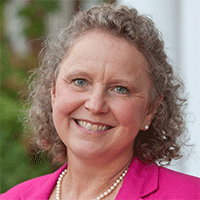
MODERATOR
Pamela Norris
George Washington University
MNHMT 2024 General Conference Chair
Dr. Pamela Norris is the Vice Provost for Research at George Washington University and the Frederick Tracy Morse Professor Emerita of Mechanical and Aerospace Engineering at University of Virginia, where she previously served as Executive Dean and as Executive Associate Dean for Research and in the School of Engineering. She is recognized globally as a leading expert in nanoscale heat transfer, especially interfacial thermal transport with a focus on thermal management across a range of length scales. She holds patents for innovative thermal management techniques for jet-blast deflectors as well as for applications of aerogels in areas ranging from biological warfare detection to lab-on-a-chip to thermal insulation.
Dr. Norris is well-known for her mentoring skills and for her dedication to increasing diversity in the STEM disciplines. In 2016 she was honored with the Society of Women Engineers Distinguished Engineering Educator Award for enduring, positive influence on students' lives as a gifted teacher, mentor, and role model; and for promoting greater diversity in STEM higher education. She is also well known for leadership in the field of nanotechnology education, chairing the American Society of Mechanical Engineers (ASME) National Nanotechnology Institute's Committee on Nanotechnology Education from 2003-2010 and organizing the first national Nano-Training Bootcamps, at the leading edge of the field. In 2021 she was elected as honorary member of American Society of Mechanical Engineers for international leadership in nano, micro and macroscale thermal science and engineering research; for tireless efforts to advance diversity in STEM fields; and for demonstrating engineering excellence as an outstanding mentor for students and faculty. She currently serves as the Editor-in-Chief of Nanoscale and Microscale Thermophysical Engineering. Dr. Norris received her Ph.D. from Georgia Institute of Technology and was a postdoctoral scholar at University of California, Berkeley.
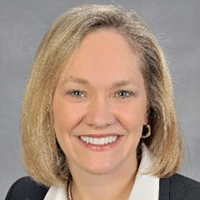
PANELIST
Cynthia Hipwell
Texas A&M University
Cynthia Hipwell has been working in the area of technology development based upon nanoscale phenomena for over 25 years. She received her B.S.M.E. from Rice University and her M.S. and Ph.D. in Mechanical Engineering from the University of California, Berkeley. Upon graduation, she went to work at Seagate Technology’s Recording Head Division in Bloomington, MN. During her nearly two decades at Seagate, she held multiple individual contributor and leadership roles including Executive Director of Advanced Mechanical Technology and Executive Director of Advanced Transducer (Electrical) Development, leading the electrical feasibility demonstration of heads for the radical new recording technology Heat Assisted Magnetic Recording (HAMR). She was inducted into the National Academy of Engineering for "leadership in the development of technologies for areal density increase in hard disk drives" in 2016 as well as the National Academy of Inventors in 2018. In 2017, she joined the faculty of Texas A&M where she currently serves as the Oscar S. Wyatt, Jr. '45 Chair II in Mechanical Engineering and Director of INVENT Lab, conducting research in nanoscale heat transfer for electronics cooling and nano and microscale phenomena in the finger-device interface for haptics and dexterous robotics, as well as teaching classes in innovation and new product development.
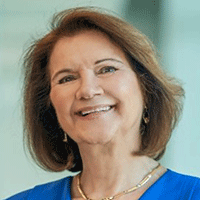
PANELIST
Cristina Amon
University of Toronto
Cristina Amon is University Professor, Alumni Distinguished Professor and Dean Emerita of the Faculty of Applied Science and Engineering at the University of Toronto (UofT). She is the Scientific Director of the UofT's Electrification Hub and Director of the ATOMS Laboratory. Prior to joining UofT in 2006, she was the Raymond J. Lane Distinguished Professor and Director of the Institute for Complex Engineered at Carnegie Mellon University. She has pioneered the field of Computational Fluid Dynamics and the development of multidisciplinary multiscale hierarchical modelling, concurrent design and optimization methodologies for thermo-fluid transport phenomena, with applications to renewable energy, biomedical devices, and thermal management of electronics and electric vehicles.
Professor Amon was appointed to the Order of Canada and inducted into the Canadian Academy of Engineering, Royal Society of Canada, Hispanic Engineer Hall of Fame, Spanish Royal Academy and National Academy of Engineering. She was recognized as one of Canada's Most Influential Women in 2012, the Powerful Women Trailblazers & Trendsetters in 2019, and received the highest honor for Engineers in Canada (2020 Engineers Canada Gold Medal) and Ontario (2015 PEO Gold Medal) for outstanding engineering public service, technical excellence and professional leadership.
Cristina Amon is the founding chair of the Global Engineering Deans Council and has served in numerous editorial and technical conference roles, advisory and review boards in North America and abroad. She received her Mechanical Engineering degree from Simon Bolivar University in Venezuela, and her M.S. and Sc.D. from the Massachusetts Institute of Technology.
Wednesday Aug 7, 10:10am-11:40am
Textbooks and Pedagogy in Micro/Nanoscale Heat and Mass Transfer
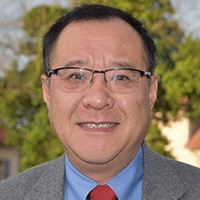
Zhuomin Zhang
Georgia Institute of Technology
Co-Moderator
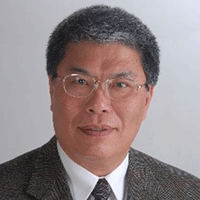
D. Y. "Robert" Tzou
University of Missouri
Co-Moderator
Synopsis: Nano/microscale heat transfer has become one of most active areas of research since 1992, when ASME organized the first special session on Fundamental Issues in Small Scale Heat Transfer during its Annual Winter Meeting held in Anaheim, California. Since then, physical devices have continuously shrunk from microns well into nanometers while ultrafast transient has shortened from pico-, femto- all the way to attoseconds. The rapidly expanding physical and mathematical contents to address the rapidly evolving new physical phenomena in this field have made effective transmission of knowledge in both research and education very challenging. To facilitate effective teaching and learning, this panel focuses on the educational aspects of nanoscale heat transfer at both the graduate and undergraduate levels. They include the development of textbooks, teaching tools, teaching methods, and mentorship. Panelists will share their experiences in an audience-centered discussion on approaches.
Panelists:
D. Y. "Robert" Tzou, University of Missouri
Gang Chen, Massachusetts Institute of Technology
Timothy Fisher, University of California Los Angeles
Liqiu Wang, Hong Kong Polytechnic University
Chang-Ying Zhao, Shanghai Jiao Tong University